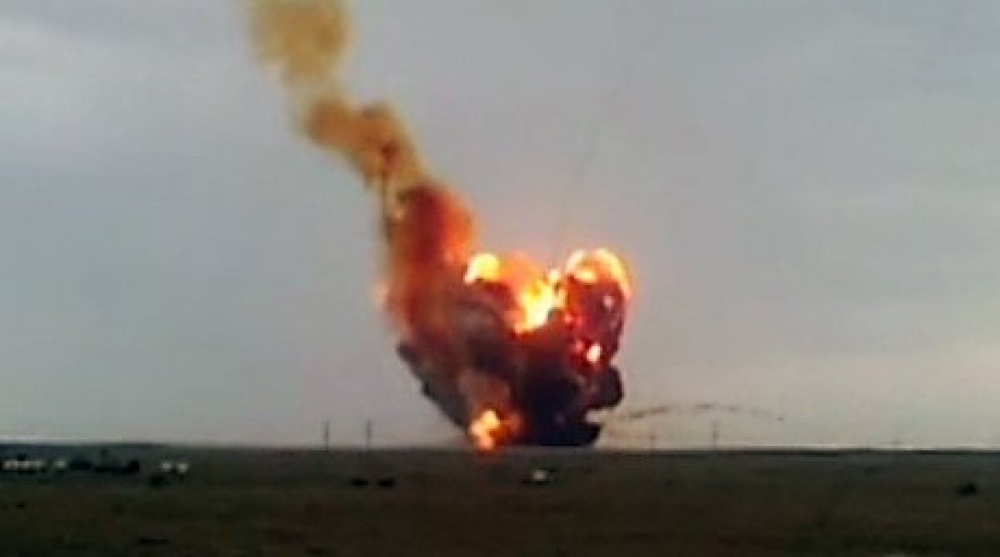
Kazakhstan has sent Russia a $90 million bill for the Proton-M carrier rocket crash at Baikonur in Kazakhstan, Tengrinews reports citing the Ministry of Environment and Water Resources of Kazakhstan. "The Ministry of Environment and Water Resources of Kazakhstan has calculated financial equivalent of the environmental damage caused by the Proton-M carrier rocket crash in July 2013 at Baikonur cosmodrome. The calculations were made based on the Rules of Economic Assessment of Damage Caused by Environmental Pollution. The damage amount made 13,690,747,305 tenge ($89.5 million)," the Ministry said. The Ministry added that the calculation was sent to the Russian Federal Space Agency -- Roscosmos -- via a diplomatic channel for consideration and compensation of the environmental damages. According to the Baikonur Cosmodrome Rental Agreement between the Governments of Russia and Kazakhstan, the authorized space agency -- the National Space Agency of Kazakhstan Kazcosmos -- is coordinating the works on Kazakhstan's behalf. The press-service reminded that a special commission was formed by an order of Prime-Minister of Kazakhstan Serik Akhmetov. The commission, led by the Minister of Environment and Water Resources of Kazakhstan Nurlan Kapparov, was observing the steps taken by the Russian partners to liquidate the negative ecological consequences caused by the Proton-M carrier rocket crash. The working commission held 5 sessions, 2 of them were field sessions at Baikonur cosmodrome when they visited the accident site and observed the detoxification of the polluted areas. "During one of the sessions of the commission, the representatives o Roscosmos said they were ready to negotiate a financial compensation of the environmental damages to Kazakhstan. Roscosmos was relying on Kazakhstan’s technology that uses hydric dioxide to recultivate the soil. The works on detoxification of the polluted territories by the direct method of the environment recovering have been completed. The heptyl rate in the soil doesn't exceed the permissible exposure limit," the Ministry of Environment and Water Resources reported. Earlier, it was reported that Kazakhstan billed Russia for the Proton-M carrier rocket crash at Baikonur, but the compensation amount was not disclosed "not to flurry the public". "I won't announce the amount of damages billed for the last accident, not to sir up the society, but our committee has calculated the ecological damage, and presented it to our Russian partners. Our Russian partners are now discussing the bill, estimating whether our calculation of damages is acceptable for them. This is a matter of negotiations. We'll see how Russia reacts," Vice-Minister of Environment and Water Resources of Kazakhstan Bektas Mukhamedzhanov said, answering questions of NGO representatives at the Civil Forum in Astana. Russia’s Proton-M carrier rocket [equipped with a DM-3 booster] carrying three Glonass-M navigation satellites crashed right after the lift-off crashed right after the lift-off at Kazakhstan-based Baikonur cosmodrome on July 2, 2013. By Baubek Konyrov





Kazakhstan has sent Russia a $90 million bill for the Proton-M carrier rocket crash at Baikonur in Kazakhstan,
Tengrinews reports citing the Ministry of Environment and Water Resources of Kazakhstan.
"The Ministry of Environment and Water Resources of Kazakhstan has calculated financial equivalent of the environmental damage caused by the Proton-M carrier rocket crash in July 2013 at Baikonur cosmodrome. The calculations were made based on the Rules of Economic Assessment of Damage Caused by Environmental Pollution. The damage amount made 13,690,747,305 tenge ($89.5 million)," the Ministry said.
The Ministry added that the calculation was sent to the Russian Federal Space Agency -- Roscosmos -- via a diplomatic channel for consideration and compensation of the environmental damages. According to the Baikonur Cosmodrome Rental Agreement between the Governments of Russia and Kazakhstan, the authorized space agency -- the National Space Agency of Kazakhstan Kazcosmos -- is coordinating the works on Kazakhstan's behalf.
The press-service reminded that a special commission was formed by an order of Prime-Minister of Kazakhstan Serik Akhmetov. The commission, led by the Minister of Environment and Water Resources of Kazakhstan Nurlan Kapparov, was observing the steps taken by the Russian partners to liquidate the negative ecological consequences caused by the Proton-M carrier rocket crash. The working commission held 5 sessions, 2 of them were field sessions at Baikonur cosmodrome when they visited the accident site and observed the detoxification of the polluted areas.
"During one of the sessions of the commission, the representatives o Roscosmos said they were ready to negotiate a financial compensation of the environmental damages to Kazakhstan. Roscosmos was relying on Kazakhstan’s technology that uses hydric dioxide to recultivate the soil. The works on detoxification of the polluted territories by the direct method of the environment recovering have been completed. The heptyl rate in the soil doesn't exceed the permissible exposure limit," the Ministry of Environment and Water Resources reported.
Earlier, it was reported that Kazakhstan billed Russia for the Proton-M carrier rocket crash at Baikonur, but the compensation amount was not disclosed "not to flurry the public". "I won't announce the amount of damages billed for the last accident, not to sir up the society, but our committee has calculated the ecological damage, and presented it to our Russian partners. Our Russian partners are now discussing the bill, estimating whether our calculation of damages is acceptable for them. This is a matter of negotiations. We'll see how Russia reacts," Vice-Minister of Environment and Water Resources of Kazakhstan Bektas Mukhamedzhanov said, answering questions of NGO representatives at the Civil Forum in Astana.
Russia’s Proton-M carrier rocket [equipped with a DM-3 booster] carrying three Glonass-M navigation satellites crashed right after the lift-off crashed right after the lift-off at Kazakhstan-based Baikonur cosmodrome on July 2, 2013.
By Baubek Konyrov
Continuation


 +7 (777) 001 44 99
+7 (777) 001 44 99















































